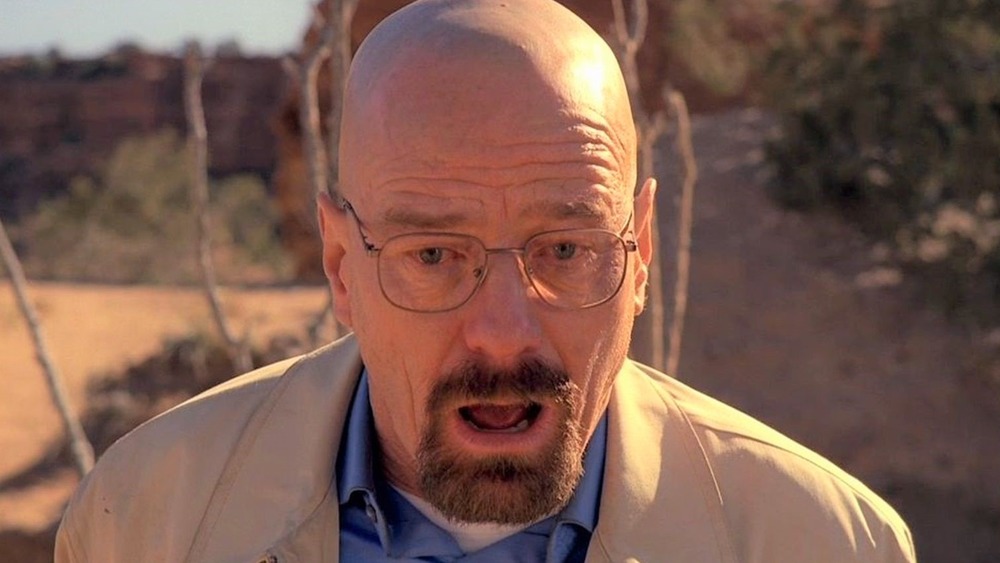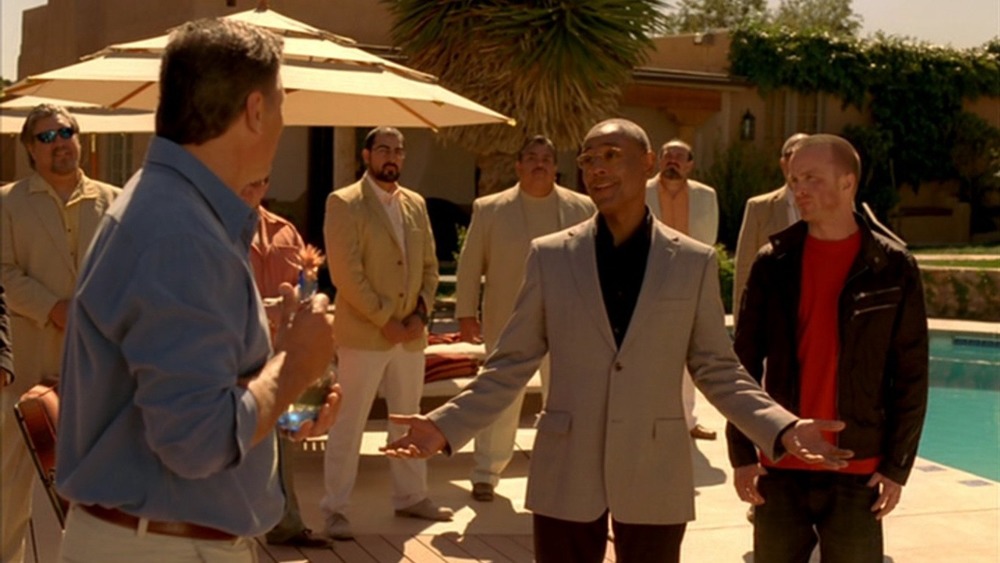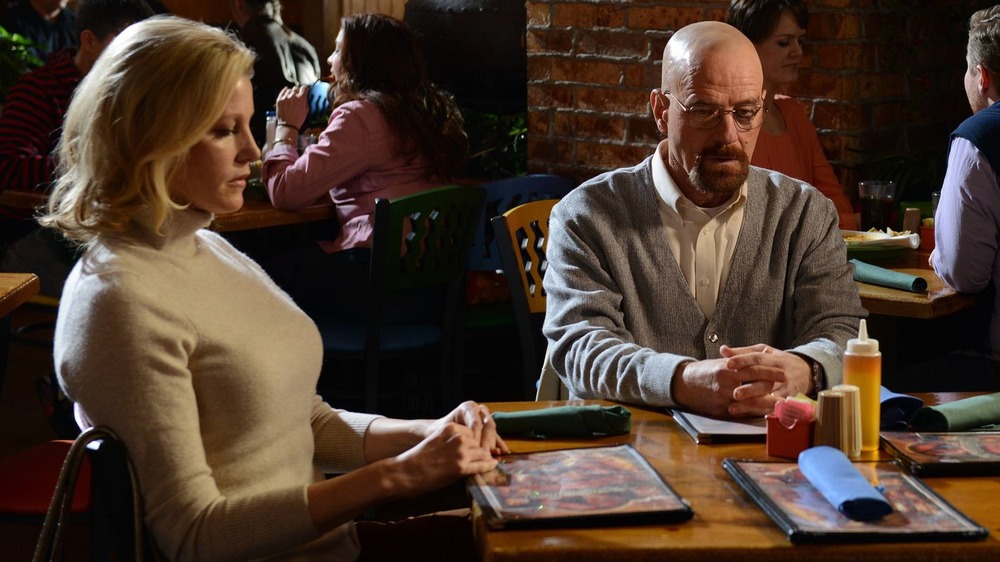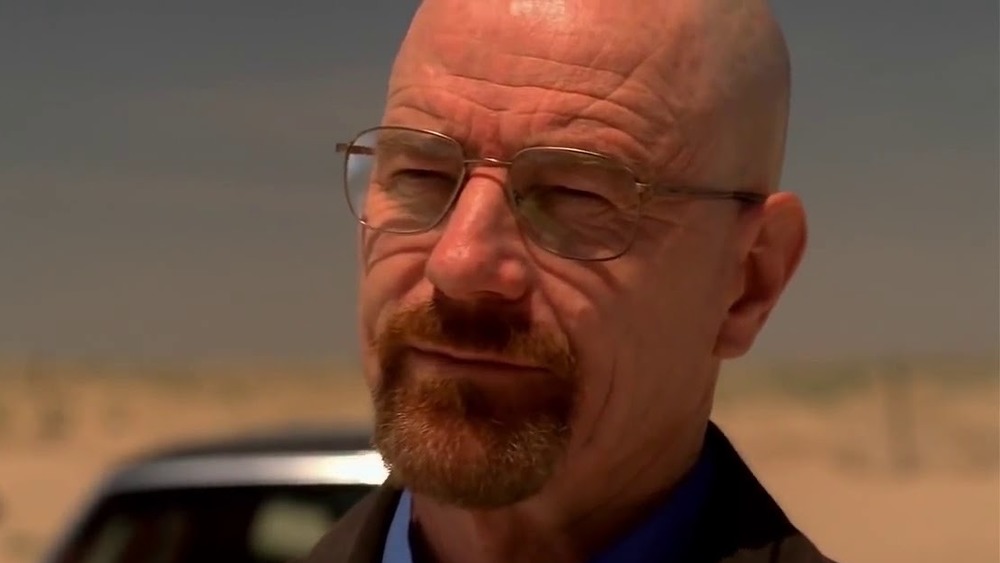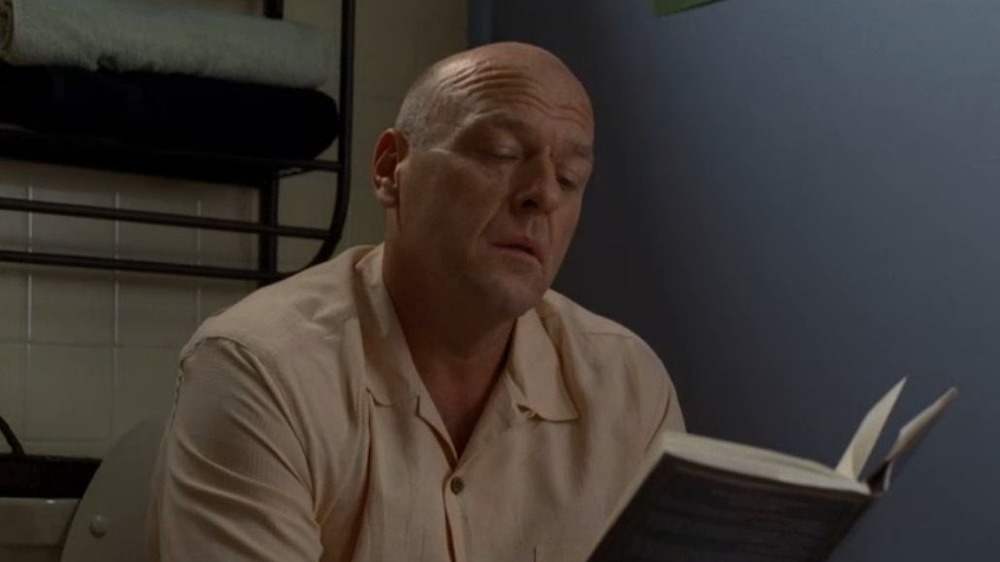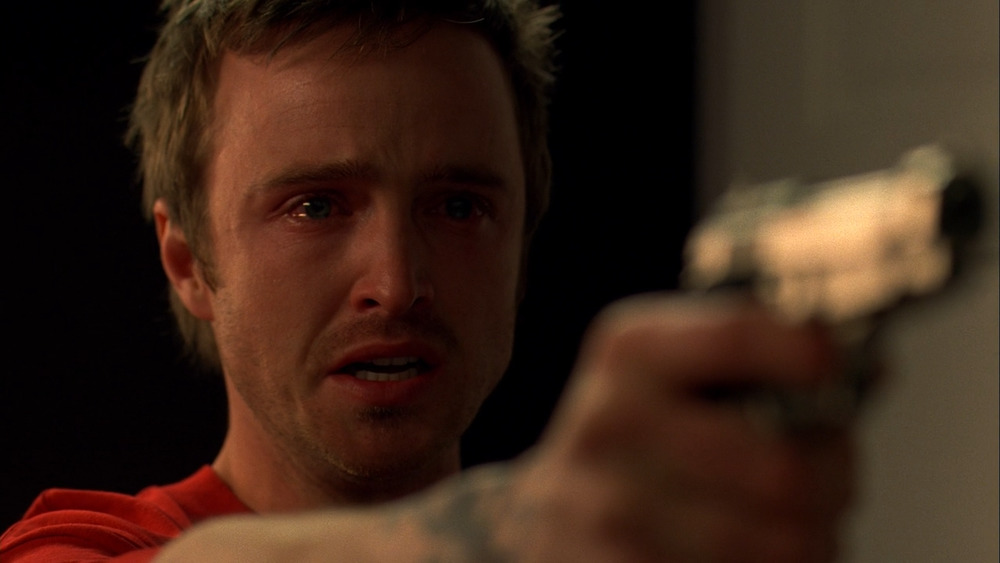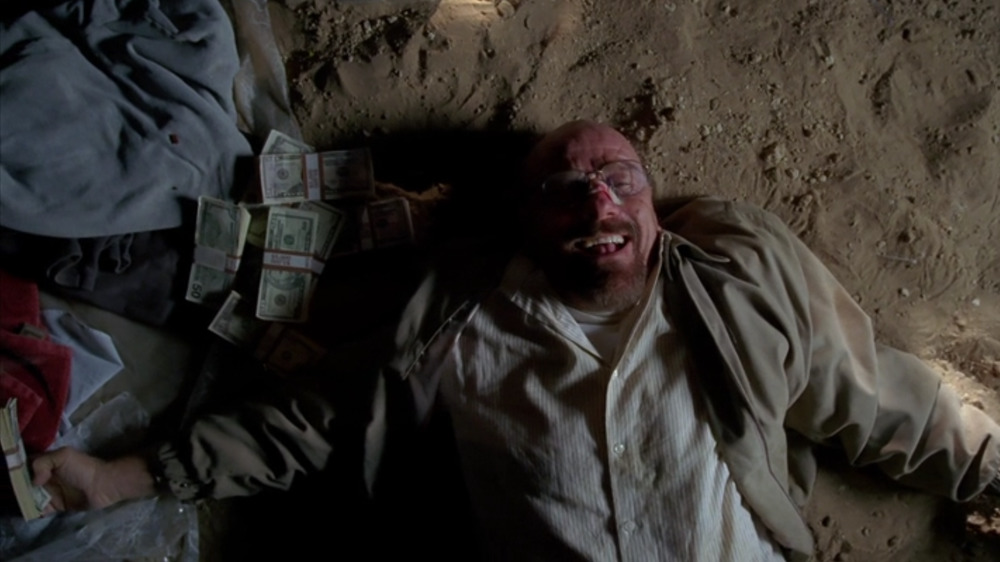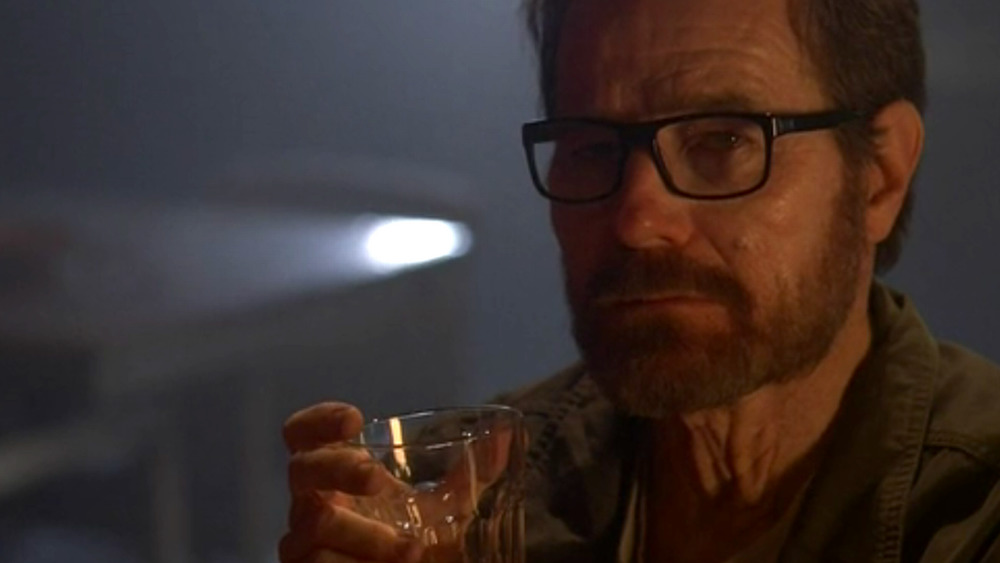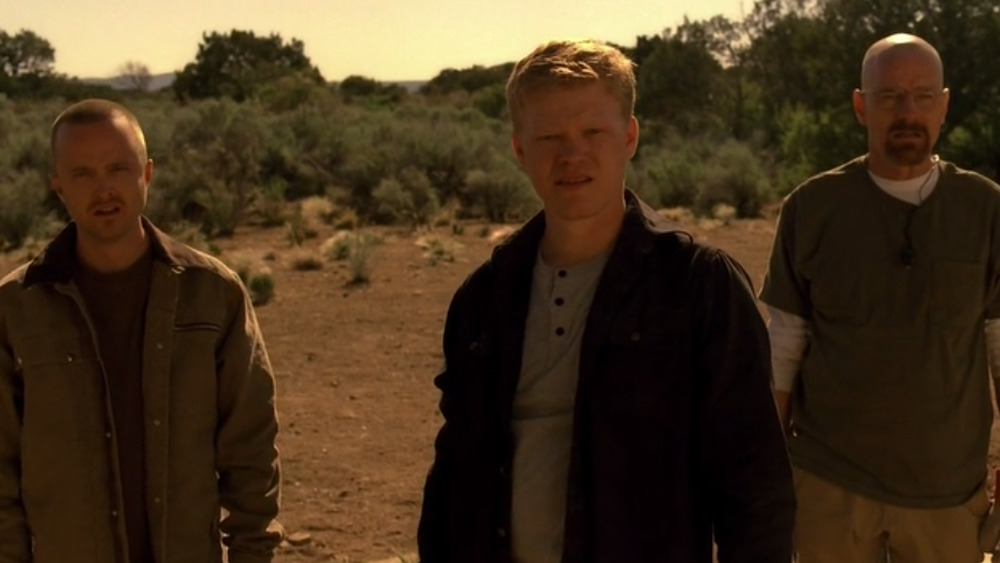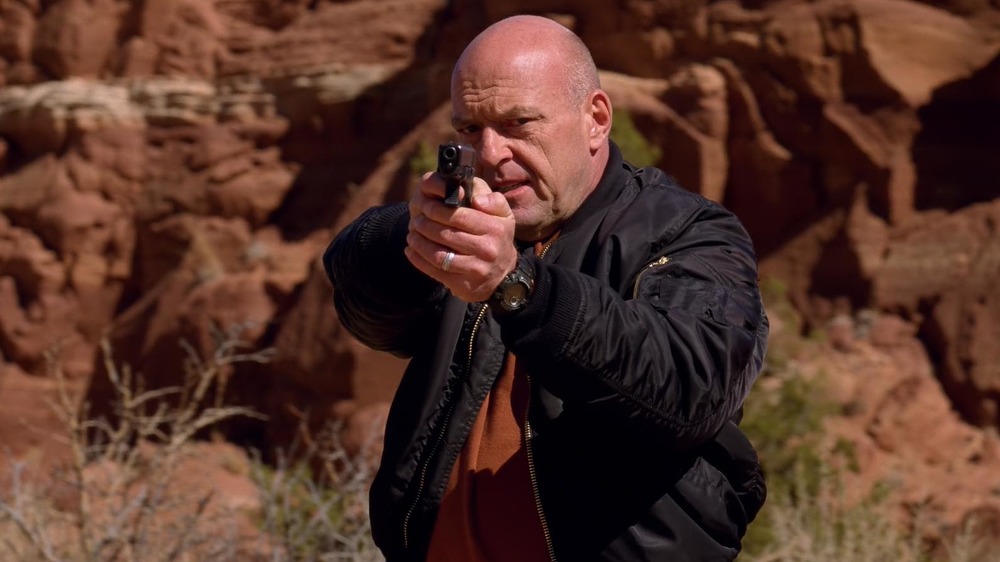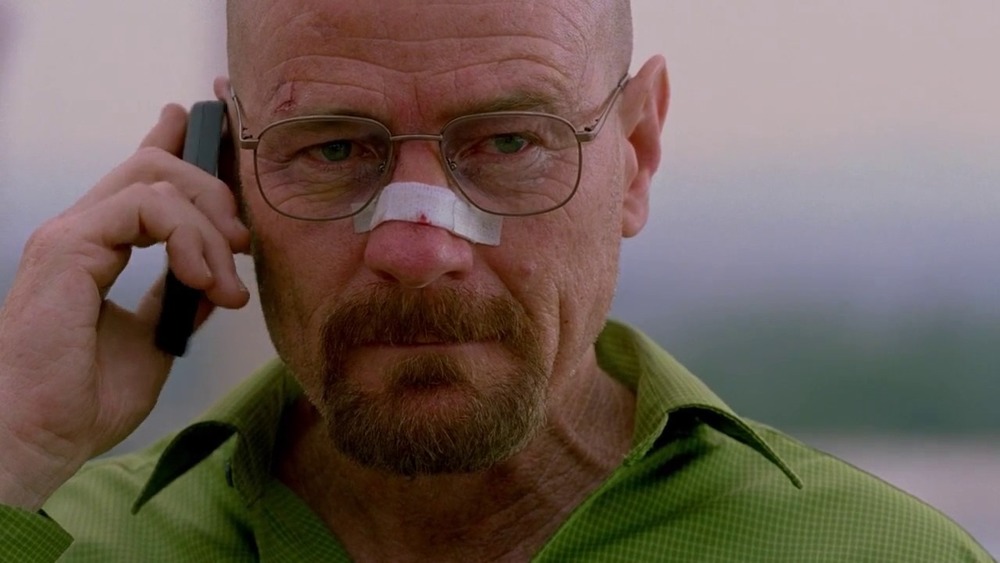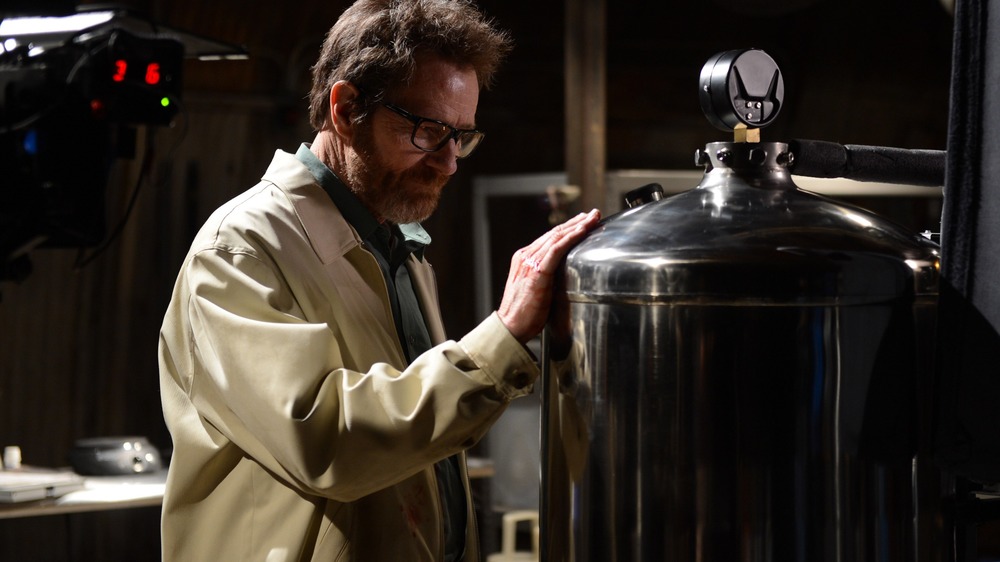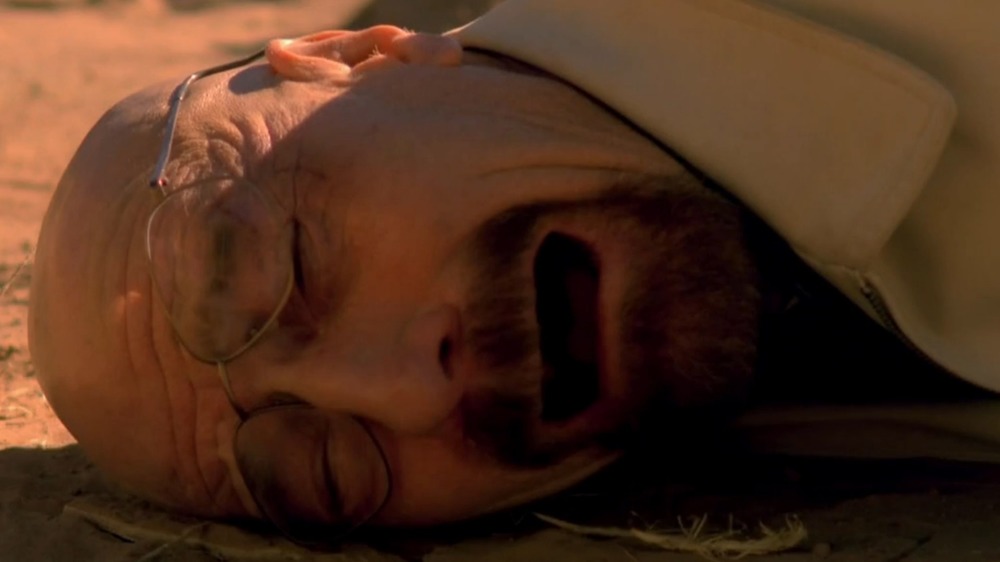The Best Episodes Of Breaking Bad
We've said it before, and we'll say it again — there are no bad episodes of Breaking Bad. There just aren't. Even "Fly," a roughly midpoint season-stuffer that's controversial for the lack of important developments, is an excellent character study. Other than that, every minute of screen time that Vince Gilligan and company shared the story of Walter White's moral collapse with us was utilized just about perfectly. The "worst" episodes of this show are as solid as the best in other good shows. Now that's a feat.
However, that's not to say there aren't episodes that stand out even from this excellent bunch. So we went ahead and dove into IMDB to find the best of the best. Fans of the show will find the expected masterpieces here, and they might also note that the majority of these take place towards the end of the series. But that's just a testament to the fact that a show that started great only got better. From bloody showdowns to tragic farewells, here are the best episodes of Breaking Bad.
Warning: SPOILERS AHEAD.
Salud is Gus Fring's finest moment
Don Eladio was to Gus Fring what Gus Fring was to Walt — a much more powerful and established adversary that he had to play nice with ... until it was time to make his move.
For a bit of backstory, Eladio murdered Fring's original business partner when the pair had gone down to his Mexican estate to propose a partnership. Now, in season 4's "Salud," Fring returns, flanked by Mike and Jesse, claiming he wants to bury the hatchet between Eladio's cartel and his own, smaller, north-of-the-border operation. Eladio welcomes him with open arms and drinks the tequila Gus brought as a peace offering. Unfortunately for the don and virtually his entire party, the drink has been poisoned. Gus, who spends 98% of his time wearing a fake smile and waiting for the right moment, finally gets to unleash his fury.
It's a testament to the flawless writing on Breaking Bad that we could take so much joy in the triumph of a character just three episodes before we took even more joy in that same character's demise.
Walt hurts the ones he loves in Confessions
Walt was doing all this for his family, wasn't he? That's what he'd been telling himself since the pilot episode, anyway, and part of us wanted to believe it. We all know it wasn't true, though. As he later admits, he did it for himself. And while he's unwilling to use violence against his family, he's certainly willing to stab them in the back, manipulate, and hurt them emotionally. For proof, see season 5's "Confessions."
Walt's "confession" video, in which he framed Hank as having been in on his illicit dealings since the beginning in order to intimidate the DEA agent, was one of the most evil things he ever did to someone he loved. But not the most evil. Walt loved Jesse, too, even if they weren't blood relatives. And yet, he never had an issue putting those Jesse loved in extreme harm for personal gain. He let Jane die, after all, and hospitalized a child just to manipulate Jesse into siding with him against Gus. Jesse realizes this towards the end of "Confessions," and he snaps in a way we haven't seen before. Yeah, he's cried and yelled and hated Walt, but it's instantly clear this time is different. More final.
Aaron Paul's performance at the end — when he nearly kills Saul for helping Walt poison Brock and later breaks into the White home with the intention of burning it down — is simply breathtaking.
Say My Name features a badass line and a tragic death
"I am the one who knocks" has gone on to become Walter White's definitive sneering line. But we'd like to submit "say my name" for the Academy's consideration, instead. Walt handled himself so coolly and confidently during negotiations with Declan, a rival drug dealer who wanted to buy "Fring's blue" out of the market, that the rival drug kingpin was indeed intimidated by this goofy, retired high school teacher. Even Mike, who'd tied Walt to a radiator to stop him from interfering with his original deal with Declan, was impressed.
Sadly, Mike had little time to enjoy the $5 million Walt secured for him in that very deal. After being informed that Hank's cops were on his trail and preparing to make an arrest, Mike flees. Walt, of all people, brings him his money in an off-road dirt patch by the river. Mike plans to take it and run, but he and Walt get into a screaming match that ends with Walt shooting and killing him in the heat of the moment. It's a tragic and unceremonious end for one of the show's best characters. But nobody can deny it wasn't perfectly executed. No pun intended.
Hank finally figures it out in Gliding Over All
Everything was going so well for Walt. Gus Fring was dead. Then, he'd thwarted the best pathway the cops had at tying him to Gus by destroying the laptops that contained recordings of himself. Plus, he single-handedly settled a retirement/sale dispute by convincing rival Declan to buy out Mike's share of the business and keep him employed and rich as the cook. Things ended badly with Mike, but you can't win them all. Besides, with Mike out of the way, Walt could use Jack Welker to kill Mike's imprisoned men, who might squeal and lead the police to him and Jesse.
Walt was home free near the end of "Gliding Over All," the end of the first half of season 5. Then Hank, who'd spent much of the episode crushed that his Heisenberg case had hit the wall after Walt and Jack's masterful prison hit, heads to the Whites' toilet during a barbecue. He's sitting there when the tiniest little thing leads to the breakthrough he's been looking for. While paging through a book of poetry, he discovers a note from murdered chemist Gale Boetticher to Walt, basically identifying his brother-in-law as Heisenberg.
It served as a monster cliffhanger that sent fans over the edge for the better part of a year. Luckily, the second half of season 5 didn't disappoint.
Jesse pulls the trigger in Full Measure
Drug lord Gus Fring wanted nothing more than to enjoy the lucrative baby of Walt's chemical brilliance without the bathwater of Jesse Pinkman's recklessness. None of his approaches worked. As much as he didn't understand it, Walt and that Pinkman junkie were sold in the same box. When Jesse raised hell over Gus' use of children as street level distributors, Walt chose his side over his employer's. It might not have been Jesse's drug addictions that made him such a thorn in the Fring operation's side, but Gus wasn't wrong that he and the kid wouldn't exactly see eye to eye.
However, Gus had one trick up his sleeve — have Walt teach his formula to Gale Boetticher, a slightly less brilliant but still sufficiently competent chemist — and then, ahem, do away with his former cook, thus taking care of both his Walter and Jesse problem. Unfortunately for Gus, Walt's aforementioned brilliance didn't stop at cooking meth. The chemist quickly picked up on what was happening and used to Jesse to kill Gale at his home, thus making the pair inseparable. As a result, season 3's "Full Measure" was heartbreaking television and easily one of the show's most well-crafted and intense moments. And it was only uphill from there.
Walt absolutely loses it in Crawl Space
In her defense, Skyler had a good reason for handing over the bulk of Walt's illicit savings to her paramour and former boss, Ted Beneke. The dull-normal buffoon was cooking books that were completely covered with her name, so she desperately needed a cash infusion to placate the IRS before Uncle Sam came knocking on Heisenberg's door.
But these developments in season 4's "Crawl Space" couldn't have come at a worse time. Gus Fring, upon realizing he could no longer keep Hank Schrader at bay, decides to kill him. If Walt tries to interfere on behalf of his brother-in-law, he promises, "I will kill your wife. I will kill your son. I will kill your infant daughter."
Walt has no intention of allowing Hank, who'd barely survived the last assassination attempt Walt unwittingly exposed him to, to die. But he'd rather disappear, using Saul's "vacuum cleaner repairman" connection, than go toe-to-toe with Gus Fring. He goes home to collect the cash in his crawl space, but he only finds loose bills where stacks of green had previously been. When Skyler tells him what happened to the money, he simply snaps, unleashing a tortuous wail that morphs into a demonic, howling laugh. It's the stuff of small-screen acting legend.
Granite State is a low-key but crucial Breaking Bad episode
After the madness and devastation of "Ozymandias," a (relatively) low-key episode was in order. But "low-key" doesn't mean slow or boring. There are plenty of important and heartbreaking developments in season 5's "Granite State." For one, Walt's cancer is winning its battle against him. Jesse's attempts to escape his torturous, meth-cooking enslavement results in the death of Andrea, leaving Brock motherless not long after his doubtlessly terrifying stint in the hospital. Skyler and Marie both have their homes invaded by Jack's goons, terrifying them into silence. All of this can be traced back to Walt, either directly or indirectly.
But the episode's best moment comes at the end. Walt tries to sneak money to his family through one of Walter Jr.'s friends, but his son is having none of it. "You killed Uncle Hank!" he howls at his father, who's calling from a phone in a bar. "Why are you still alive? Why don't you just die already?"
This, of course, devastates Walt, who decides to turn himself in. While he's awaiting the police, however, he catches a Charlie Rose interview in which Gretchen and Elliott Schwartz, his former business partners, diminish his role in the formation of their company. And just like that, that old spark of resentment that truly drove him is reignited. The theme song plays as police officers swarm the bar, only to find it empty.
Walter White may be willing to die, but Heisenberg still has a fight left in him.
An innocent pays dearly in season 5's Dead Freight
"They thought of everything," Todd Alquist later boasted to his uncle. He was referring to the heist he'd taken part in, in which Walt, Jesse, and Mike had stolen what Lydia Rodarte-Quayle had called "an ocean" of methylamine, from a train.
The team had, in fact, thought of just about everything. They thought about when and where to boost the goods, what to do with the crew, how to replace the stolen methylamine with an equal weight's worth of water so nobody would know the train got robbed, and so forth. It almost failed but didn't, and Walt later brags that if you list train robberies by the value of what was taken, this magnum opus tops the list and then some. It was yet another victory for the team.
That is, at least, until local teenager Drew Sharp rides up on his dirt bike and surprises the group. Before anyone can stop him, Todd shoots the kid in the head, not wanting to leave behind a witness. Of course, as an enraged Jesse points out, the kid almost certainly didn't know what he'd seen and therefore wasn't much of a threat.
Of course the episode would end this way, right? It's Breaking Bad, where the innocent pay dearly for every one of Walt's triumphs. It's heart-wrenching but far, far too well written, acted, scored, and filmed for us to have it any other way.
Walt's plans begin to fall apart in To'Hajiilee
Breaking Bad is all about Walt turning from a mild-mannered high school chemistry teacher into a ruthless drug lord. That being said, he never loses the last ounce of his humanity, at least in regards to his family. He was doing this for them, after all. Or so he tells himself.
When he realizes Hank has accompanied Jesse to the area near the To'Hajiilee Indian Reservation, where he's buried his ill-gotten gains, Walt tries to cancel the hit he'd placed on Jesse through meth-dealing neo-Nazi Jack Welker. It doesn't work. Jack arrives anyway, just in time to thwart Hank's triumphant arrest of his criminal, backstabbing brother-in-law. How it all ends isn't revealed until the next episode, which fans rightfully remember as being the one where it all falls apart for Walt.
Season 5's "To'Hajiillee," though, is where the final plans of Hesienberg's initial run — namely, to slip through Hank's net and get rid of an increasingly rabid and dangerous Jesse — hit the wall. He's tricked into leading his enemies right to his stash in a way neither he nor we saw coming at all. It's not like fans hadn't been trying obsessively to decipher clues to predict the show's remaining future. It's just that the writers were simply too good to show their hand.
Walt wins in Face Off
Season 4's finale, "Face Off," is mainly notable for the jaw-droppingly gory demise of Gus Fring, one of television's greatest villains and one of the few characters who could go up against Walter White and beat him. However, he couldn't beat himself.
When Gus thought Hector Salamanca was cooperating with the DEA to take him down, he simply couldn't stay out of it. It was far too late by the time the kingpin realized he'd been tricked. The old, paralyzed gangster promptly blew himself and half of Gus to hell with a bomb Walt had tucked neatly beneath his wheelchair seat. Gus adjusting his tie post-blast, sans half his face, is one of the most iconic and haunting images to ever grace the small screen.
Thing is, though, nearly every other scene in the episode is just as great. Jesse being interrogated by the two FBI agents who think he's poisoned Brock with ricin is an immaculately written scene. Apparat's "Goodbye" playing as Gus slowly walks into the nursing home will send shivers down your spine. Walt and Jesse destroying the lab afterwards is one of the most all-around well-executed scenes of the entire show. Then, of course, there's that iconic "I won," delivered by Walt to an increasingly unsettled Skyler after his victory. Nobody watching the show for the first time could possibly imagine it getting any better than this.
But it did.
Breaking Bad finished things perfectly with Felina
In the lead-up to the finale of what had rapidly evolved from an obscure cult hit to a cultural juggernaut, fan theories ran wild. How would Breaking Bad end? Would Walt get revenge on Jack? Would Jesse team up with him to get it done? Would they kill each other? What about Lydia, Marie, Skyler, and Junior? Maybe Walt would get arrested?
Well, in season 5's "Felina," Walt scares Gretchen and Elliott into giving what's left of his money to his family in the form of an irrevocable trust. He then heads home, poisons Lydia, gives Skyler information on where Hank and Steve Gomez are buried so she can strike a deal with the prosecutor, and sees Holly and Walter Jr. one last time. Then he heads off to Jack's compound, rescues Jesse, and dies of an accidentally self-inflicted bullet wound after killing everyone inside.
George R. R. Martin publicly announced that some people had indeed guessed the big upcoming twist of Game of Thrones. But to our knowledge, nobody guessed exactly how Breaking Bad would end, even though the episode didn't really contain any twists or turns. It's just a straightforward, satisfying finale that makes you simultaneously pleased with the excellent ending and sad that it's over. Maybe some of that sadness comes from the fact that, deep down, we all know this show was one of a kind and is unlikely to be matched in the near future.
Ozymandias is Breaking Bad's best (and most devastating) episode
Not many shows could get away with an episode filled with relentlessly bleak and depressing developments without at least breaking it up with humor or one or two hopeful moments. But the rules never applied to Breaking Bad.
There isn't a single happy or funny moment in "Ozymandias," the show's antepenultimate episode. It begins with Hank getting executed by Jack Welker despite Walt's pleas for mercy. Then, Jesse is captured and hauled off to an uncertain but certainly horrible life in captivity. Then, Flynn learns the truth about his father's criminal activities. Next, both he and Skyler rebuke and fight Walt when he demands they flee with him. Then, Walt kidnaps his infant daughter before leaving her in a fire station to be recovered. And finally, he tells his family that Hank is indeed dead, crushing them all, and vanishes.
The hits simply don't stop coming as, one by one, plotlines the show had developed since the pilot come to inevitable and devastating conclusions. In a nutshell, Walt's family — the one thing he started all this to begin with — lies in ruins.
It's horrifying, but you can't take your eyes off it. That's because Ozymandias isn't just the best Breaking Bad episode ever but one of the greatest episodes in the history of television. Look on this work, ye mighty, and despair.
